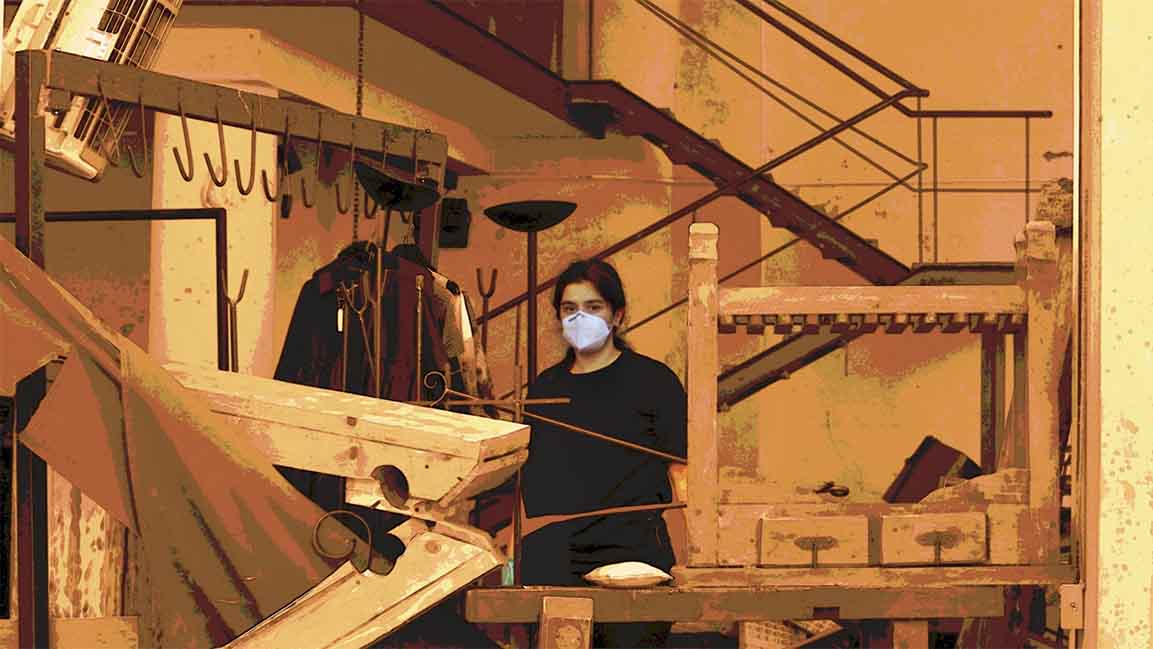- | 9:00 am
Two years on, women-led businesses are building back from the Beirut blast
NGOs are constructing shops, offering financial aid and training to businesses affected by the devastating explosion in 2020.

More than two years after Beirut’s Port explosion destroyed her workshop in Mar Mikhail, artisan Nada Sleiman’s is back in business thanks to the support of NGOs advocating women’s empowerment.
Recalling that doomed day on August 4, 2020, Sleiman says, “Nothing was standing. There were no doors, no windows, and no walls… Everything broke. I could not believe what happened.”
The home accessories designer couldn’t recover her workshop without the support of Stand for Women, an NGO that partnered with other nonprofits to rebuild women-led businesses.
Sleiman adds it took six months to complete the reparation and another two years to restart her business.
“Physical rehabilitation was not enough,” she says. “Mar Mikhail remained a ghost area for a long time. However, Stand for Women, and other NGOs were our salvation board. They encouraged me by saying, ‘We love your designs; you should not stop producing. We are here to support you.’ Thanks to them, I returned to my workshop; otherwise, repairing it would have been impossible.”
The massive explosion caused by the detonation of 2,750 tonnes of ammonium nitrate, which had been improperly stored in a port warehouse for six years, claimed the lives of more than 200 people, injured thousands, and displaced 300,000, mostly in Mar Mikhail and Gemayze neighborhoods. Most artists, designers, and artisans are located in this cultural hub.
Fashion designer and founder of Mellow, Guilda Khoury, had her cloth shop, workshop, and warehouse in Mar Mikhail. She says NGOs’ support gave her the will to stand back on her feet.
NGOS SUPPORT WAS CRUCIAL
“It was not easy to see the business, which took me seven years of hard work to build, get destroyed in a matter of seconds. NGO’s support was crucial. Without their help, it would have been much more difficult and would have taken a long time to be back in business,” Khoury said.
While some NGOs did the construction work, others offered Khoury financial aid to buy materials and helped her promote her brand abroad. However, two and a half years after the blast, business isn’t good enough because of the economic crisis in Lebanon.
“We are managing by participating in exhibitions and fairs abroad. As much as possible, we are trying to remain present and sustain the business,” Khoury adds.
An unprecedented economic crisis has crippled Lebanon since 2019. The national currency has lost more than 95% of its value, driving up prices, depositors denied access to their bank accounts in foreign currencies with tight restrictions on withdrawals, and poverty rates have sky-rocketed, with around 80% of people now classed as poor, according to the United Nations.
Stand for Women was founded by Caroline Fattal in 2017 to empower women and help them become financially independent.
“If we don’t help women to be self-sustainable and run their businesses, they will be forever dependent. Women are generally marginalized and the last ones to be supported. We wanted to put the focus on them exclusively because it is at the core of our mission,” Fattal says.
The group collaborated with UN Women to assess the damages inflicted on businesses owned by female entrepreneurs in Mar Mikhail and Gemayze and partnered with about 25 NGOs.
SUPPORT AND TRAINING
It supported three categories of women businesses: The hairdressers, florists, and tailors, who could not afford employees and run their businesses by themselves; women who employed three to four people, such as restaurant and mini-market owners; and designers and artisans.
“We supported more than 180 women entrepreneurs and micro businesses, including 25 designers, artists, and artisans,” Fattal adds.
Following a customized approach, Stand for Women assisted in buying paints and brushes for artists, raw materials for designers and artisans, and equipment such as sewing machines and photocopiers.
The NGO also offered female entrepreneurs business development workshops and training in crisis management and put them in contact with foreign investors to help expand their businesses outside Lebanon. They were also trained on social media.
“We’re very proud of the impact of our work,” Fattal says. “More than two years after the explosion, we surveyed the businesses we supported and found that 95% are still operating. It confirms that investing in women is a sustainable investment. Today life has come back to Mar Mikhail and Gemayze; businesses are flourishing despite the economic and financial challenges we face.”
Interior architect Beatrice Bakhache had volunteered with March, a peace-building NGO that trains vulnerable youth and delinquents in various construction skills. It involved reconstructing all types of businesses regardless of gender.
“We only supported businesses because the funding was granted to help reinvigorate the economy,” Bakhache says. “The young people we had trained rebuilt the places from scratch, including walls, woodwork, windows, doors, metal, and paint. Owners had only to refurbish their shops to resume work.”
“We rebuilt at least 60 places. The owners were eager to reopen their businesses. They kept asking us to finish the work quickly. A businesswoman who designed bridal headpieces was back in business shortly after we repaired her workshop,” Bakhache adds,
Artist Maral Manisse had her studio and home in Gemayze devastated by the port explosion. She now lives and works in the studio after the NGOs repaired it.
“I am grateful to all the NGOs that helped me, including Stand for Women, which gave me paints and brushes. They even bought some of my paintings and sold them in auctions in the US,” Matisse says.
She did her first post-explosion exhibition recently with the support of NGOs.
“The works were rather gloomy, depicting scarred faces and fearsome personages; I also did a big painting that I titled August 4. This is how I could overcome the trauma that I experienced. It helped me move on and not give up,” Manisse adds.







































